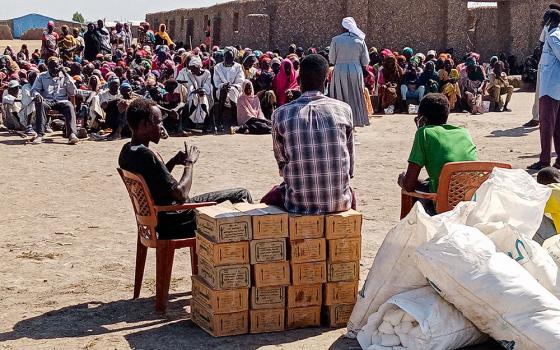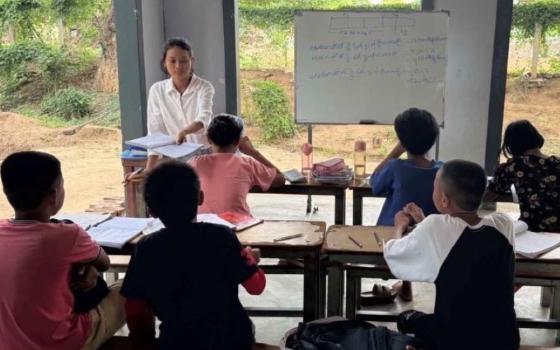
(Unsplash/Nick Fewings)
Humility and hospitality, two central themes that emerge from this Sunday's readings, are two virtues that need to be recovered for the full flourishing of life on the planet.
The first reading from Sirach, one of the Bible's Wisdom books, features a father instructing his son on how to conduct his affairs. Although the instruction is located within a patriarchal setting that privileges the education of males, the lesson taught is the lesson to be learned by people of all ages in a contemporary world culture that relishes self-aggrandizement, self-centeredness and individual achievement at the expense of others and others' resources. This lesson on humility is reinforced in the Gospel that describes table etiquette in relation to class and one's perceived self- importance. Both in the Gospel and in the responsorial psalm, humility is foundational to hospitality.
Besides being a social virtue, humility has a psychological component. It involves recognizing our strengths and limitations, appreciating the gifts and talents of others who can complement and contribute to our own resourcefulness, and respecting others' views and perspectives offered from diverse social locations and life experiences. Humility is a virtue that fosters individual and communal health. It enhances well-being, reduces defensiveness and encourages conversation, collaboration and empathy.
No finer instruction could a father give to his son than the instruction offered in Sirach that centers on humility. Both in biblical times and in today's culture, power rests with males. That power is often used egotistically, aggressively and competitively to disenfranchise, control and reinforce structural and systemic hegemony. One has only to look at how many world leaders conduct their affairs in their quest for superiority and supremacy. Would that more fathers instruct their sons in the way that the father of Sirach instructs him. Good and healthy parenting of children leads to a healthy, inclusive and just society. In the home, instruction in humility begins with parents modeling this virtue in their lives and in their relationships with their children. Regardless of age, everyone is a perennial learner.
The Gospel story from Luke adds to the discussion on humility. It features table etiquette, a virtue especially important in today's society where the table is not the oblong banquet table but the oblong boardroom table. Typically, the person with the most power sits at the head of the table, signifying leadership and authority over all other members at the table. But this arrangement has shifted in current times. Now the person with the most power, the one exercising the greatest decisive leadership, might sit in the middle position of the table. Regardless of where one sits at the table, the Gospel reading invites deeper questions such as "Who is invited to the table?" "What shape is the table — oblong or round?" "Is it a table of equals or one that is hierarchical with power resting only in the 'host'?"
Advertisement
Today's Gospel invites us to reflect on the current composition and leadership styles of all sociopolitical boardroom tables that set in motion decisions for our global world. The disenfranchised and those who struggle have neither place nor voice at the table, and the meal served, the policies made, nourish only a few. Focusing on social table etiquette is important, but life's pressing needs compel us to shift our critique from the dining room table to the boardroom table, to examine and critique those seated at that table, including the "host," for at that table lies the future of our global socio-political-economic well-being.
The responsorial psalm expands the notions of humility and hospitality. The psalm celebrates the Holy One of Israel as a benevolent God whose hospitality of heart cares for both the human and the nonhuman, for the poor, the widow, the orphan, the disenfranchised and even the languishing earth. This divine hospitality of heart, rooted in profound humility to stretch beyond oneself, is practiced not just in word but also in action.
Sweeping cuts to Medicaid are occurring within the United States, global poverty is increasing in the form of limited or no food and education access, unclean drinking water, growing economic inequality, dislocation caused by raging wars and the continued loss of habitat and food sources for our nonhuman neighbors all indicate the absence of hospitality.
This psalm asks us two questions, "If our lives are in tune with the Divine heart, then how are we making a home for those in need within our world?" and "Who are the 'poor'?" They have names and faces within our human and nonhuman communities of life. A hospitality of heart that embodies divine love begins with our recognizing "the other" as our own, with our ability to empathize and our decision to create new tables that can welcome and accommodate all.







